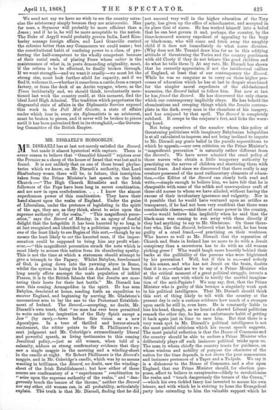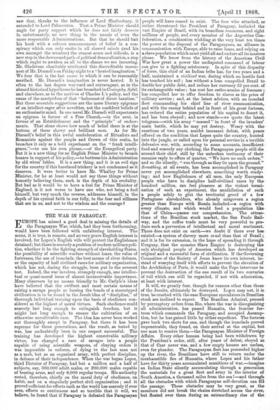MR. DISRAELI'S HOBGOBLIN.
MR. DISRAELI has at last not merely satisfied the Record, but made it almost hysterical with rapture. There is ,every reason to believe that " Gamaliel himself" rejoices over ,the Premier as a sheep of the house of Israel that was lost and is
found. It is not unlikely that on one of those broad phylac- teries which we know, on Mr. Disraeli's authority, that Lord Shaftesbury wears, there will be, in future, this inscription taken from the Prime Minister's last speech on the Irish Church :—" The High Church Ritualists and the Irish followers of the Pope have been long in secret combination, and are now in open confederation. . . . I know the almost superhuman power of this combination. They have their hand almost upon the realm of England. Under the guise
of Liberalism, under the pretence of legislating in the spirit of the age, they are, as they think, about to seize upon the supreme authority of the' realm." "This magnificent peror- ation," says the Record of Monday, in an agony of fearful delight that the hobgoblin it has been haunted by so long, is at last recognized and identified by a politician supposed to be one of the least likely to see Bogies of this sort,—though by no means the least likely to act the haunted man, if the imper- .sonation could be supposed to bring him any profit what- ever,—" this magnificent peroration struck the note which is most likely to arouse this nation from its slumbering apathy. This is not the time at which a statesman should attempt to give a triumph to the Papacy. Whilst Babylon, foredoomed of God, is going down into the yawning abyss in Rome, whilst the system is losing its hold on Austria, and has been long nearly effete amongst the male population of infidel France, it is in the British Islands that the Jesuits are mus- tering their hosts for their last battle." Mr. Disraeli has seen this coming Armageddon in the spirit. He has seep Babylon, desolated at home, sending forth an expedition to recover England, and beginning by nerving Mr. Gladstone's unconscious arm to lay the axe to the Protestant Establish- ment of Ireland. The Record,—accepting, no doubt, Mr. Disraeli's own tenet, that " no man has ever been permitted to write under the inspiration of the Holy Spirit except a Jew " (by race),—bows before this vision as a new Apocalypse. In a tone of thrilled and horror-struck excitement, the editor points to Sir R. Phillimore's re- cent judgment and Mr. Coleridge's extraordinarily liberal .and powerful speech, as living testimonies to this coming Jesuitical policy,—just as old women, when told of a calamity, adduce as strong confirmatory evidence that they saw a single magpie in the morning and a winding-sheet in the candle at night. Sir Robert Phillimore is the Record's magpie, and in Mr. Coleridge's candle, which was by no means wanting in brilliance, the Record, no doubt, saw the winding- sheet of the Irish Establishment ; but how either of these omens are confirmatory of a " superhuman " combination to seize upon the supreme authority of the realm," and " dan- gerously touch the tenure of the throne," neither the Record nor any other old woman can, in all probability, articulately explain. The truth is that Mr. Disraeli, finding that he did not succeed very well in the higher education of the Tory party, has given up the office of schoolmaster, and accepted in its place that of nurse. He has worked himself into a belief that he can best govern it and, perhaps, the country, by the time-honoured nursery expedient of appealing to the bogy or black-man, who will come and fetch away the naughty child if it does not immediately do what nurse dictates. (Why does not Mr. Tenniel draw him for us in this edifying attitude of threatening the Tories and the country gentlemen with old Clooty if they do not behave like good children and do what he tells them ?) At any rate, Mr. Disraeli has shown that he correctly appreciates, if not the intellectual calibre of England, at least that of our contemporary the Record. While he was so sanguine as to carry on those higher pro- cesses of education which he has at last in despair abandoned for the simpler moral expedients of the old-fashioned nurseries, the Record failed to follow him. But now at last he has found the Record. He has discovered the only charm which our contemporary implicitly obeys. He has beheld the abominations and creeping things which the Jesuits contem- plate in the dark, every man in the chambers of his imagery, and has conjured by that spell. The Record is completely subdued. It creeps to the conjuror's feet, and licks the warn- ing hand.
Not being ourselves of the number whom this policy of threatening politicians with imaginary Babylonian hobgoblins is at all calculated to impress, and not being inclined to impute to Mr. Disraeli any grave belief in the puerile superstitions to which he appeals,—our own criticism on the Prime Minister's "magnificent peroration " is naturally rather different from the Record's. We have never admired the cruel policy of those nurses who obtain a little temporary authority by practising on the nerves of children and shattering them with unreal fears. And since we discovered that there really is any creature possessed of the most rudimentary elements of educa- tion,—the Editor of the Record can clearly both read and write,—simple enough to believe him, we have felt that he is chargeable with some of the selfish and unscrupulous craft of those old nurses to whom we have alluded, without having the excuse of their involuntary ignorance and vulgarity. Nor is it possible that he would have ventured upon an artifice so transparent, if he had not been very confident that there were considerable classes,—and those of some power in the country, —who would believe him implicitly when he said that the black-man was coming to run away with them directly if they had anything to say to Mr. Gladstone. On those there- fore who, like the Record, believed what he said, he has been guilty of a cruel fraud,—of practising on their weakness. Who knows so well as Mr. Disraeli that the separation of Church and State in Ireland has no more to do with a Jesuit conspiracy than a snowstorm has to do with an old woman picking geese ? Who would laugh more heartily behind their backs at the gullibility of the persons who were frightened by his peroration ? Well, but if this is so,—and nobody in his senses, and who has not Jesuit on the brain, doubts that it is so,—what are we to say of a Prime Minister who at the critical moment of a great political struggle, invents a fable of this sort with which to terrify the morbid imagina- tion of the anti-Papists ? We may say, first, that the Prime Minister who is guilty of this betrays a singularly weak spot in his political intelligence. That Mr. Disraeli should think this sort of thing likely to tell with the country at the present day is only a curious evidence how much of a stranger upon earth he still is, even here. He is constantly liable to
lose his head, though, as we heard a shrewd Liberal politician remark the other day, he has an unfortunate habit of getting it back again just in time to save him. But that there is a very weak spot in Mr. Disraeli's political intelligence is not the most painful criticism which his recent speech suggests. The most painful reflection is that the House of Commons and the country should be able to endure a Prime Minister who deliberately plays off such insincere political tricks upon us. The man in whom chiefly the country trusts for guidance, on whose wisdom and nobility of purpose the character of the nation for the time depends, is not above the poor manoeuvres and insincere pretences of a Taper and a Tadpole. We say it
is a dishonour to the House of Commons, and a slur upon England, that our Prime Minister should, for election pur-
poses, affect to believe in conspiracies—likely to revolutionize the realm and "touch dangerously the tenure of the Crown," —which his own tickled fancy has invented to amuse his own leisure, and with which he is striving to hoax the Evangelical party into extending to him the valuable support which he
saw that, thanks to the influence of Lord •Shaftesbury, it extended to Lord Palmerston. That a Prime Minister should angle for party support which he does not fairly deserve is, unfortunately, no new thing in the annals of even the more respectable Administrations. But that he should bait his hook with a solemn announcement of belief in a con- spiracy which can only excite in all shrewd minds (and his own amongst the number) the utmost scorn and ridicule, is a new step in the downward path of political demoralization, a step which ought to awaken us all to the shame we are incurring. Mr. Gladstone charitably attributed this discreditable mares- nest of Mr. Disraeli's on Friday night to a "heated imagination." We fear that is the last cause to which it can be reasonably ascribed. Mr. Disraeli's imagination is never heated. It is often to the last degree wayward and extravagant, as in the absurd historical hypotheses he has broached in Coningsby,Sybil, and elsewhere, as to the motives of Charles L's policy, and the cause of the martyrdom of that "holocaust of direct taxation." But these eccentric suggestions are the mere literary epigrams of an intellect eager after novelties, not the confident beliefs of an enthusiastic mind. In one novel Mr. Disraeli will expectorate an epigram in favour of a Free Church,—in the next, in favour of an Establishment and the " principle" of endow- ments. That alone shows how much of belief there is at the bottom of these showy and brilliant mots. As for Mr. Disraeli's belief in this awful confederation of Ritualists and Romanists against the people and Crown of this realm, he broaches it only as a bold experiment on the " frank intelli- gence,"—to use his own phrase,—of the Evangelical party. But it is a new thing for an English Prime Minister to broach hoaxes in support of his policy,—to buttress his Administration by old wives' fables. It is a new thing, and it is an evil sign for the country if this barefaced trickery is not condemned as it deserves. It were better to have Mr. Whalley for Prime Minister, for he at least would not say these things without honestly believing them, such is the depth of his credulity. But bad as it would be to have a fool for Prime Minister of England, is it not worse to have one who, not being a fool himself, but very much the reverse, addresses himself, in the depth of his cynical faith in our folly, to the fear and silliness that are in us, and not to the wisdom and the courage ?



































 Previous page
Previous page